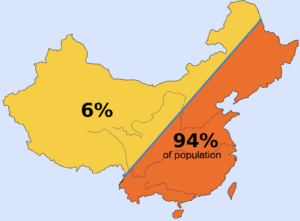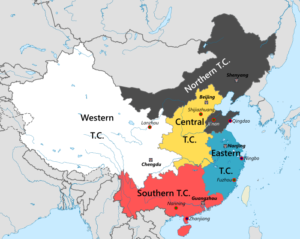China’s military modernisation has been top driven, well guided process.
Through observing other countries’ wars, including the Gulf War, the China realised that the information dominance was key to winning modern warfare.
Active Defence Strategy and Unrestricted Warfare
China has consistently followed the military strategy of “active defence”. However, the meaning and interpretation of the strategy has undergone changes from time to time.
In Mao Zedong’s era the strategy was premised on “striking only after the enemy has struck” in the overall back drop of total war (World war scenario).
In Deng Xiaoping’s era, local war using conventional weapons was elevated to strategic level, and the active defence strategy came to encapsulate the concept of pre-emptive attack conceived in local wars.
In Jiang Zemin’s era, the goal was to win “local wars under high-tech conditions.”
In Hu Jintao’s era, China recognized the importance of information in warfare, and the goal became winning “local wars under the conditions of informationisation.” Network-centric war is the closest equivalent of this terminology.
After Xi Jinping came to power, China’s aim shifted to winning informatised and intelligentised warfare making use of all the domains, including space, cyber, electromagnetic and psychological. Unrestricted warfare is the terminology introduced in the Chinese military lexicon.
The targets of attack in this type of warfare will include not only physical objects but also nontangible targets in cyber and cognitive spaces. The warfare is not restricted to military and military hardware. This type of warfare uses anything as a weapon in the DIME paradigm.
Information Warfare and Cyber Domain
The People’s Liberation Army (PLA) has recognised that “information dominance” is crucial for seizing core initiative in modern warfare.
In this process, the Strategic Support Force (SSF) was established in late 2015. It appears that the SSF is responsible for achieving information dominance as well as providing information support for joint operations, including the space, cyber, and electromagnetic domains, and converting advanced technologies into military capabilities.
To achieve information dominance, the PLA also attaches importance to information warfare and cyber operations. This includes monitoring (surveillance), offensive operations (cyber-attacks) and defensive operations.
To cope with these challenges, China has sought to indigenise core technologies and train specialists in the cyber field.
Military Use of Space
China considers space as an essential domain for the prospective intelligentised warfare.
China’s space activities from their inception have been closely linked to military activities. However, it was only from the 1990s through the 2000s that the military value of space began to be recognized more widely in the PLA.
The PLA uses space to provide information support for operations on land, sea, and air and is also developing capabilities to disrupt other countries’ use of space.
In China, emerging space enterprises have rapidly boosted their technological capabilities with government and military support. The future is expected to herald an era in which the military adopts the technologies developed by the private sector and uses their services.
China’s Military-Civil Fusion Strategy
In China, military capabilities are being enhanced through military-civil fusion (MCF).
The MCF strategy advanced by the Xi administration aims to strengthen military capabilities and promote national development by tying together the military and socio-economy.
Since its establishment, the PLA has maintained close relations with the private sector, including participating in production activities. However, this relationship has changed with the times.
As science and technology takes on an increasing role in the security sector, and against the backdrop of the rising technological level of China’s private companies in the shift to a market economy, emphasis has been placed on MCF to enhance the military capabilities of the PLA.
The Xi administration created the Central Commission for Military-Civil Fusion Development, a powerful organization. It has launched measures in succession to ensure the smooth implementation of MCF.
In conjunction, the commission promotes the prioritisation of science, technology, and industry for national defence in new security domains, the active use of cutting-edge technologies for military purposes, and indigenisation of core technologies.
Thought
At times it is prudent to learn few things from one’s adversary.
Are we doing that?
For regular updates please register here –
https://55nda.com/blogs/anil-khosla/subscribe/
References
NIDS China Security Report 2021.
https://thediplomat.com/2021/04/chinas-military-has-a-hidden-weakness/
https://www.lowyinstitute.org/the-interpreter/is-china-speeding-up-military-modernisation-it-may-but-its-not-yet
https://en.wikipedia.org/wiki/Modernization_of_the_People%27s_Liberation_Army
https://www.cfr.org/backgrounder/chinas-modernizing-military


